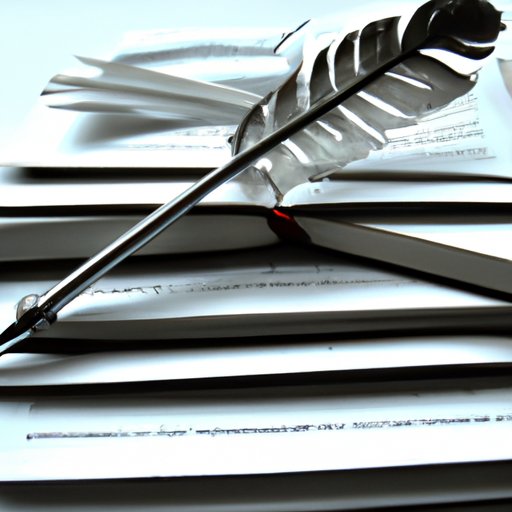Introduction
Repetition is a common and effective technique used by authors to emphasize certain ideas, create rhythm, and evoke emotion. It is found throughout literature, from poetry to fiction, and can be used to great effect in both long and short pieces of writing. In this article, we will explore what repetition is and how it can be used to enhance the meaning of a text.
Definition of Repetition in Literature
Repetition is the use of words or phrases more than once in a piece of writing. It is a literary device that is used to emphasize a point or create a sense of rhythm. Repetition can be used to draw attention to an idea, create a mood, or reinforce a concept. It can also help to create a sense of unity, structure, and continuity within a text.
Overview of the Benefits of Using Repetition
The power of repetition lies in its ability to emphasize certain ideas and create a sense of rhythm. By repeating words or phrases, an author can draw attention to a particular concept and make it stand out. It can also be used to create a sense of structure, unity, and continuity within a text. Additionally, repetition can evoke emotion, as it can be used to create a sense of nostalgia or longing.

Analyzing the Use of Repetition in Literature
Repetition is a powerful tool that can be used to great effect in both poetry and fiction. Let’s take a closer look at how authors use repetition in their work.
Examining Repetition as a Literary Device
Repetition is one of the most commonly used literary devices. It can be used to create emphasis, evoke emotion, and create a sense of rhythm. For example, in his poem “Do Not Go Gentle into That Good Night”, Dylan Thomas uses repetition to emphasize the idea of fighting against death: “Do not go gentle into that good night/ Rage, rage against the dying of the light.” Here, Thomas repeats the phrase “rage, rage” to draw attention to the idea of resistance.

Breaking Down the Different Types of Repetition in Writing
Repetition can take many forms, from simple word repetition to the repetition of entire phrases or sentences. Some common types of repetition include:
- Alliteration: The repetition of consonant sounds at the beginning of words, such as “the slimy snake slithered silently.”
- Anaphora: The repetition of a word or phrase at the beginning of successive clauses, such as “We shall fight on the beaches, we shall fight on the landing grounds, we shall fight in the fields and in the streets.” (Winston Churchill)
- Epistrophe: The repetition of a word or phrase at the end of successive clauses, such as “Ask not what your country can do for you—ask what you can do for your country.” (John F. Kennedy)

Exploring the Power of Repetition in Poetry and Fiction
Repetition is a powerful tool that authors can use to great effect in both poetry and fiction. Let’s take a closer look at how repetition can be used to enhance the meaning of a text.
Investigating the Role of Repetition in Storytelling
In fiction, repetition can be used to create a sense of rhythm and structure. For example, a character’s name may be repeated throughout a story to emphasize the importance of that character. Repetition can also be used to create suspense, as it can be used to build tension and anticipation. Additionally, it can be used to create a sense of foreboding, as it can be used to hint at events that are yet to come.
How Repetition Can Enhance the Meaning of a Text
In poetry, repetition can be used to emphasize certain ideas and create a sense of rhythm. For example, Walt Whitman uses repetition to emphasize the theme of unity in his poem “Song of Myself”: “I celebrate myself, and sing myself/ And what I assume you shall assume/ For every atom belonging to me as good belongs to you.” Here, Whitman repeats the phrase “I celebrate myself” to emphasize the idea of unity between himself and the reader.
Conclusion
Repetition is a powerful tool used in literature to emphasize certain ideas, create rhythm, and evoke emotion. It is a versatile literary device that can be used to great effect in both poetry and fiction. Repetition can be used to draw attention to an idea, create a mood, or reinforce a concept. Ultimately, it can be used to enhance the meaning of a text.

Summary of the Benefits of Repetition in Literature
In conclusion, repetition is a powerful tool used in literature to emphasize certain ideas, create rhythm, and evoke emotion. It can be used to draw attention to an idea, create a mood, or reinforce a concept. Additionally, it can be used to create a sense of unity, structure, and continuity within a text. Ultimately, repetition can be used to enhance the meaning of a text.
Final Thoughts on the Use of Repetition in Writing
The power of repetition lies in its ability to emphasize certain ideas and create a sense of rhythm. By repeating words or phrases, an author can draw attention to a particular concept and make it stand out. It can also be used to create a sense of structure, unity, and continuity within a text. Finally, repetition can evoke emotion, as it can be used to create a sense of nostalgia or longing.
(Note: Is this article not meeting your expectations? Do you have knowledge or insights to share? Unlock new opportunities and expand your reach by joining our authors team. Click Registration to join us and share your expertise with our readers.)
